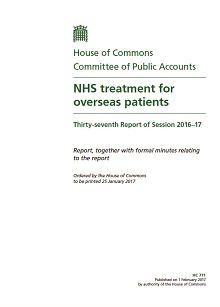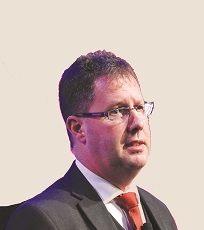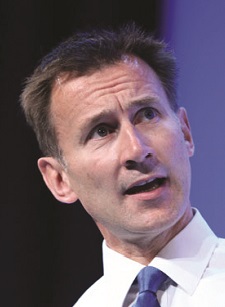News / News review - March 2017
Plans to charge overseas visitors for elective care and the ongoing struggle over winter pressures dominated health news in February. While some commentators believed the announcement on overseas patients was merely an attempt to distract from the very real strains on the NHS, it created much debate. 
The Commons Public Accounts Committee kicked off the discussion at the beginning of the month. It said the NHS must take urgent action to recover more of the cost of treating patients from overseas. In a report, NHS treatment for overseas patients, the MPs said the Department of Health should do more to ensure the public is confident the costs are being recovered. It added that it was not convinced that the Department was taking effective action and that its efforts were hampered because the NHS was not identifying all chargeable patients. NHS England and clinical commissioning groups were not doing enough, the committee added. It called on the Department to publish an action plan by June.
Only a few days later, the Department announced that hospitals will be required to check if patients must pay for their non-urgent treatment before it is given. The new measures will be implemented in April and will require trusts to charge those who are not eligible for free treatment. The Department said the regulations would play a key part in delivering its target of recouping £500m a year from overseas visitors not eligible for free care. It added that NHS Improvement will be working intensively with trusts with the most potential to recover costs in the coming months.
If the government did intend this to be a distraction, it only worked a few days, until NHS England published the latest figures for performance at A&E departments. A&E attendances continued to rise in December, with just over 1.9 million cases, an increase of 4.1% on December 2015. The figures showed attendances at all types of A&E departments were 4% higher than a year earlier and there was a 3.5% increase in the number of patients admitted to hospital compared with December 2015. Emergency departments once again breached their four-hour target, with 86.2% of patients seen in that time – 91% were seen in December 2015.
Scottish A&E performance was better. A&E departments there saw 92.6% of patients within four hours in December, according to official figures. There were almost 131,000 attendances during the month – the highest for the last month of the year since 2012. Health secretary Shona Robison said the performance was due to the dedication of staff. She added that a small number of emergency departments were facing challenges and the government would work with the appropriate health boards to provide the support they require.
Although the power-sharing executive in Northern Ireland has crumbled and there will be fresh elections on 2 March, health minister Michelle O’Neill (right) was able to publish a plan to reduce waits for elective treatment and diagnostics. She has been named as leader of her party, Sinn Féin, in Northern Ireland. The plan includes six commitments, including reducing the waiting list backlog while reforming secondary, primary and community care services. The first phase requires around £31m in non-recurrent revenue in 2017/18 to clear the backlog of people waiting more than 52 weeks for a first outpatient appointment and inpatient/day case. The backlog of patients waiting more than 26 weeks for diagnostics will also be cleared by the end of the financial year, under the plan. However, the funding has not yet been approved.
In February there was a fresh warning on inefficiency. NHS Providers and the Royal College of Surgeons said that lack of bed availability is creating inefficiencies. In a letter published in The Sunday Times, the organisations said cancelled operations delayed patient care and led to an inefficient use of staff time. Surgeons were ‘kicking their heels’ as they waited for a bed to become available so they could operate. They called on NHS England and NHS Improvement to learn the lessons from this winter.
Despite the earlier protests of doctors, the new GP contract for England includes a clause preventing GP practices that regularly close for a half day from receiving extended hours funding. However, announcing the new contract, NHS England, the government and the British Medical Association said practices that partner with others to offer more evening and weekend appointments would be eligible for additional non-contractual funding over and above the existing extended hours scheme. The change will be implemented in October. Also in the new contract, GPs will get a 1% pay increase, with a 1.4% uplift for expenses. An additional £239m will be added to contract funding, while negotiations on the Carr-Hill formula – used to calculate core funding for general medical services (GMS) practices – will begin shortly with a view to implementing changes in 2018.
The Welsh NHS Confederation called for a 
shift towards preventative services to improve health and reduce demand. It said the NHS and other public bodies must take heed of public support for prevention – a survey for the confederation found that the public believed prevention should be in the top four priority areas for funding. Wales health secretary Vaughan Gething (right) warned that longstanding and unacceptable performance issues would not be tolerated. Though progress had been made, he wanted further reductions in waiting for planned care and diagnosis. He added that he wanted to incentivise excellence and was looking at the best ways to achieve this.
The Department of Health has opened a consultation on a proposed fixed recoverable costs scheme for lower value clinical negligence claims. It said the proposed scheme would allow for quicker and more cost-effective resolution and more opportunities for early learning. The consultation closes on 1 May.
The HFMA has published a paper looking at environmental sustainability reporting requirements for commissioners and providers. The paper also examines the wider government requirements and where best practice and guidance can be accessed.
In the media
With NHS finances firmly in the headlines, the HFMA has been widely quoted in the media over the past month. 
The release of provider Q3 figures by
NHS Improvement prompted the BBC to look at the reasons behind the overall deficit. HFMA policy director Paul Briddock (right) told health editor Hugh Pym NHS staff had done a ‘remarkable job in trying to keep services going while delivering over £2bn of efficiencies’. He told National Health Executive hospitals were a barometer of how the service is coping and the difficult winter was taking its toll on services.
Though published in December, the HFMA NHS financial temperature check continued to attract attention, particularly when assessing the state of NHS finances and the role of sustainability and transformation plans. In a comment for National Health Executive, Mr Briddock said the temperature check had shown initial support for STPs and a belief that they are encouraging greater collaboration between commissioners and providers. But finance directors had concerns over governance and risk management arrangements. The introduction of STPs was positive, Mr Briddock said, but they faced great challenges, including delivering efficiency savings and coping with other pressures, such as workforce planning and reducing agency spending.
Quotes
‘These figures reveal a service under enormous pressure. It was not designed to care for so many older people with long-term health conditions and it is unsurprising that this is affecting patient care.’
Responding to the latest NHS operational performance figures, NHS Confederation chief executive Niall Dickson calls for a redesign of the health and care system
‘I’m proud of our achievements, but I want us to be more ambitious for 2017. I want us to continue to reduce planned care and diagnostic waits. I want us to build a health service that meets and delivers on the needs of our patients and that is sustainable, in spite of the challenges.’
Wales health secretary Vaughan Gething calls for further reform of the local service
 ‘We are announcing plans to change the
‘We are announcing plans to change the
law, which means those who aren’t eligible for free care will be asked to pay upfront for non-urgent treatment. We aim to recover up to £500m a year by the middle of this Parliament – money that can then be reinvested in patient care.’
Health secretary Jeremy Hunt (right) says visitors must pay for elective care
‘We’re turning the corner on a decade of under investment in GP services but with new cash clearly tied to new ways of working that both improve patient care and support family doctors. While this new national contract is just one piece of the jigsaw, it’s another concrete step towards more convenient appointments for patients and more time for GPs to look after frail older people.’
NHS England chief executive Simon Stevens hails the new GP contract
Related content
We are excited to bring you a fun packed Eastern Branch Conference in 2025 over three days.
This event is for those that will benefit from an overview of costing in the NHS or those new to costing and will cover why we cost and the processes.